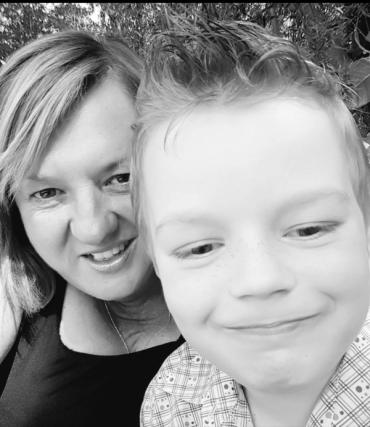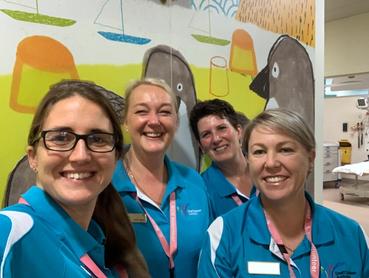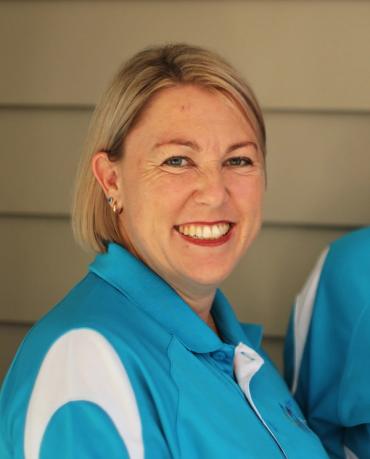Emma - I am a Parent Mentor in Victoria
Meet Emma, a parent mentor and mum raising a deaf child.
Emma is one of Deaf Children Australia's Victorian based parent mentors. Emma was drawn to becoming a parent mentor after recognising there was a need for greater support around parents with a newly diagnosed deaf or hard of hearing child. Having lived experience of raising a deaf child, Emma understands what parents might go through and is eager to offer advice and guidance to others.
Read on to learn more about this family's journey...
Darcy Elizabeth
Darcy Elizabeth was born on 23 June 2008 to Dave and I, an apparently normal healthy little girl with absolutely no risk factors for deafness. At home in the first few weeks she proved to a challenging baby who was unsettled and cried – a lot. Even when I attended a talk on getting babies to settle I missed most of it because she cried throughout, however her weight gain and general development continued to be good so it was just put down as one of those things! I did, however, start to notice that Darcy wasn’t responding to sound, even things like Dave dropping a piece of wood on the floor, which caused me to jump a mile, had no effect and she slept through the smoke detector going off even though we had our fingers in our ears.
Paranoid parents
After the “are we paranoid parents” discussion and Dave’s return to sea I took our concerns up with the local health nurses but they were convinced she could hear by her response to a rattle or bell shaken near her head. However I still had my doubts and persisted until I received a referral for Darcy to the Victorian Infant Hearing Screening Program in late July 2008. There was then a two month wait before an appointment was available at the closest suitable audiology service.
Darcy and I attended Dianella Audiology Service in September for Auditory Brainstem Response testing. The first audiologist seen was reluctant to confirm a diagnosis until Darcy was tested by a senior audiologist although she did indicate that there may be a problem, so after a further five day wait, back we went. This time, after testing, I was given a categorical response that Darcy’s test results were consistent with a profound hearing loss bilaterally.
'So many people perceive deafness as a terrible affliction...'
She is only deaf!
I was not particularly shocked to have my suspicions confirmed given her lack of reaction to even the loudest, most piercing sounds. However Dave and I were disappointed that Darcy had not been screened at birth and that we were not even made aware that this could be done. Whilst it would not have changed the outcome we could have started some bits of the processes a little earlier. Telling family and friends was perhaps the most difficult part, although I had shared my concerns with them, as so many people continue to perceive deafness as a terrible affliction rather than a manageable condition. Some people responded with how sorry they were to hear it and some of them were slightly taken aback by our response, which is always, but she’s only deaf!
Following on from Darcy’s confirmed diagnosis we started our relationships with 3 very different organisations.
Australian Hearing
At four months old Darcy was fitted with some very pretty bright pink digital hearing aids and thus followed our welcome to the world of feedback from poor fitting ear moulds on an ever growing baby. We did learn that this feedback can be a positive thing because at least you know when it’s off the ear, but it is incredibly annoying!
For six months Darcy and I attended Australian Hearing at Moonee Ponds where Carina Law provided us with lots and lots of information about deafness, the implications of Darcy’s type of hearing loss, language acquisition and perhaps most importantly the early intervention services.
However once the cochlear implants were fitted our visits to Australian Hearing became limited and now we only see them when we want something like an FM system for Darcy to use at kinder and then school (and when we are down the paddock or in shopping centres and any other time she is trying to elude us).
Aurora
I had the pleasure of meeting Sandra Lindsay in October 2008 and was delighted to find in Aurora a service that was so willing to meet our needs and aligned so naturally with our desire to ensure that Darcy had access to language and learn to communicate regardless of her hearing abilities.
Heather Mills and Irene Holub undertook the difficult task of teaching two sleep-deprived over 40’s Auslan – they were so patient and tolerant of our inabilities! As anybody who has ever attempted to learn a second language will know it is challenging and frustrating and that like all languages there are parts of it that quite simply just do not make sense. It did however provide us with the ultimate reward of talking to our daughter about the ordinary everyday things.
When Darcy was 10 months old I started attending an Early Learning Group (ELG) run by Linda Mottershead and Jina Chapman. I was quite worried at first about attending because I didn’t know much Auslan and I was still learning about having a child who was deaf and, by that stage implanted with cochlear implants, but the ELG offered Darcy the opportunity to interact with children who also sported colourful ear accessories as well as people who spoke much better Auslan than I did.
Looking back I don’t know why I worried, Linda, Jina and latterly Ash Hately were extraordinary. Jina and Ash’s patience was, apparently, limitless as I tested my slowly developing Auslan skills on them and asked them to repeat things again, and again, and again. Watching them play and talk with Darcy has been lovely and often funny, especially as she when gone through a phase of not wanting to sign and I have watched some very one-sided conversations taking place. Linda was equally amazing; in the early days she was my interpreter, teacher, ego booster and noted cuddler of babies. Sometimes the baby-burden was almost literally lifted from your arms as you walked in and off you would go to chat. Linda has the ability to facilitate and start the conversations you need to have as well as guide your child’s early development.
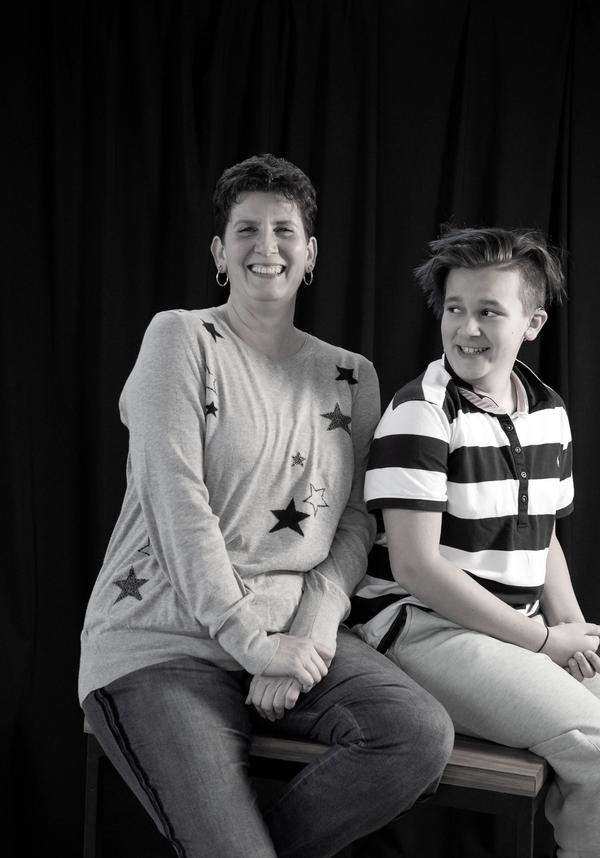
Hearing from others
And of course at every ELG there were the parents of children just like Darcy. Each one offered support, understanding and their own personal twist on the deafness journey. Each conversation I had at an ELG built my knowledge and ability to take on the role of a parent of a deaf child and be a confident advocate for their needs. And of course one of the best things about the ELG is sitting down to have a chat and a hot cup of tea and sometimes even getting to the conclusion of both without interruption!
As Darcy’s needs changed our Teachers of the Deaf changed too with Naomi Lee and Anna Wright taking the honours at different times. I look back at the visit reports from the early days with Heather and Irene where we learned all the basics for getting Darcy’s attention to the most recent reports that Anna sent me about visits to kinder where she read and signed stories thus including Darcy’s hearing friends in her world.
Teachers of the Deaf
I remember how much I used to look forward to the ToD visits, particularly when Dave was at sea, as I would finally get to hold a conversation; and by that I mean talk to an adult who would reply as opposed to a child who would reply but not necessarily make a great deal of sense. It was also a chance to sit back and actually watch Darcy and see what she had learned because one of the difficulties of being a parent is sometimes you are too close and too focussed on the routine to see the little changes. It was also a great relief to hand over the responsibility for talking and reading and singing for just a little while!
The care and professionalism of my Aurora support team cannot be over-stated. They give so much and I just wish I could have taken them into my post-Aurora life because I miss their good humour, support, conversation and insights into the Deaf community.
Cochlear Implant Clinic
Once Darcy’s result was confirmed in November 2008 we were referred to Eye and Ear Infant Hearing Loss New Diagnosis clinic and subsequently to the Cochlear Implant Clinic (CIC) at the Eye and Ear Hospital. Darcy had an MRI and CT scan in February 2009 and roared mightily (she is still rather loud) when she came round from the anaesthetic and refused to calm down until Dave and I returned from our half-eaten lunch. With no barriers to proceeding Darcy underwent surgery on 27 April at 10 months old and initial switch on took place on 13 May 2009.
Whilst our initial visits to the CIC were useful from the perspective of learning what a cochlear implant is and the implications of carrying out such an operation we did find that some aspects of the approach to language acquisition and the use of speech only as a communication tool dogmatic and were strongly discouraged from pursuing a bilingual approach. Denise Courtenay the speech pathologist ultimately assigned to Darcy took a broader view and recognised that spoken language is only one part of the communication spectrum and provided me with the tools to develop that facility in Darcy and the encouragement to continue on when it all seemed too hard.
Its hard work
Audition is hard work. The speech pathologists provide you with the tools but from then on you have to work and work and work at it. I don’t think I have ever spoken, read, and sung as much as I have done in the past few years and in the early days before there was not much response and I got thoroughly sick of the sound of my own voice. These early days were once described to me as “filling a bucket”; your child is the bucket and your voice the water – the only trouble is that nobody tells you how big the bucket is and when it might start to overflow.
But the firsts are so rewarding. The first time Darcy copied a sound, an intonation, said a word, a sentence, hummed a tune, sang along with a song. And then there is the first time that you actually say “Can you stop talking – PLEASE!” And more recently “Are you ever quiet?”
Dave and I have always been clear that regardless of the marvellous results that can be achieved through the use of technology Darcy’s deafness is not a curable condition; she will always be deaf. It is therefore important for her and for us to not only learn Auslan but to ensure that Darcy has as many opportunities as possible to part of the Deaf Community and not simply a deaf child trying to fit into the hearing world.
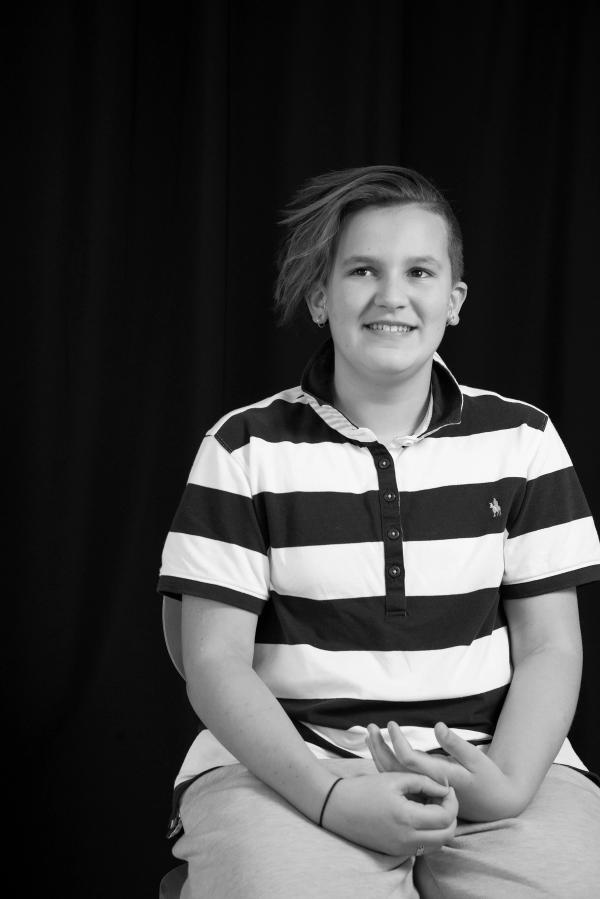
Part Two – Kinder and School to follow – when Anna nags me enough!....

